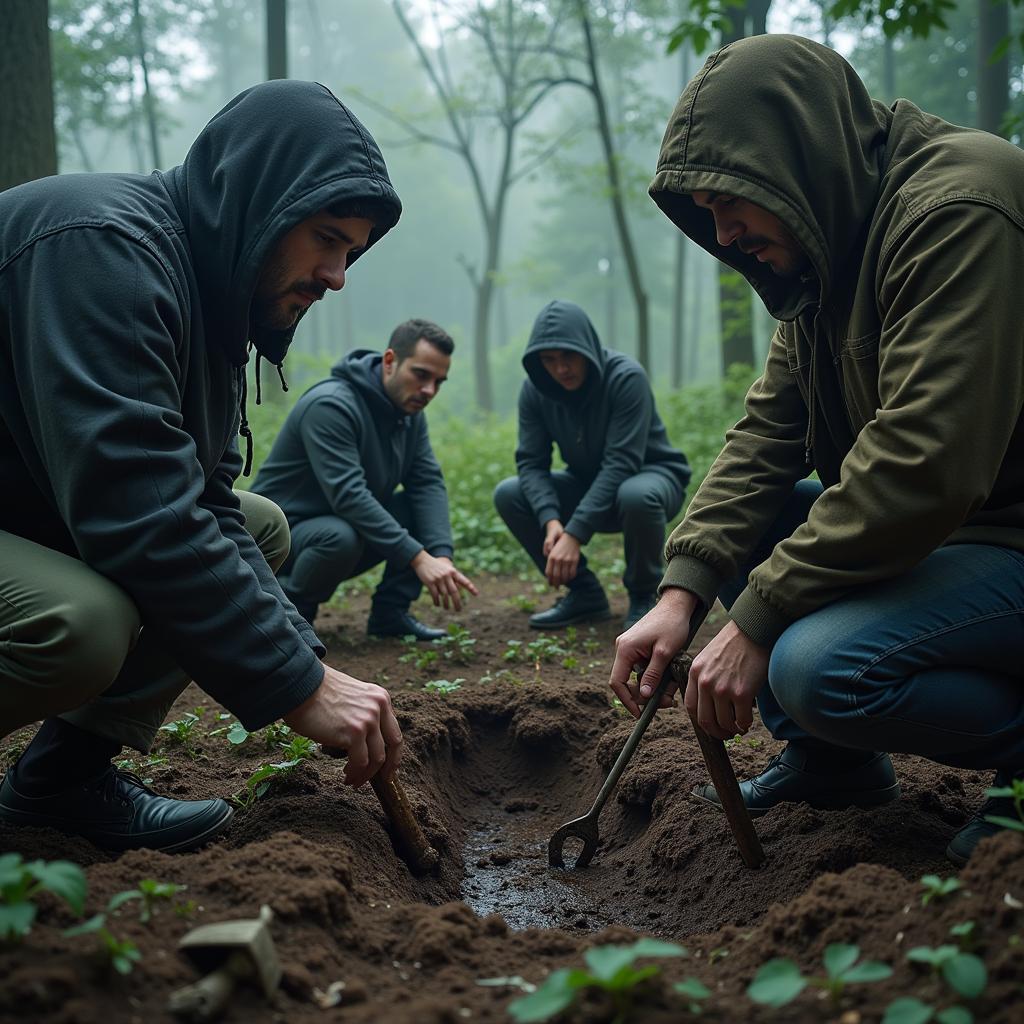Excavation Research plays a crucial role in paranormal investigations, offering a tangible link between the physical world and the spectral realm. Whether it’s unearthing forgotten cemeteries, exploring ancient ruins, or investigating sites of reported paranormal activity, excavation research allows us to delve into the past and potentially uncover evidence of the unexplained.
Digging deeper into the earth can reveal much more than just artifacts and remnants of previous civilizations. It can unearth the energies and echoes of past events, potentially providing clues to paranormal occurrences. This involves careful planning, meticulous documentation, and a deep respect for the history and potential mysteries embedded within the soil. But what exactly does excavation research entail in the world of paranormal investigation? Let’s explore.
The How and Why of Paranormal Excavation Research
Excavation research in a paranormal context isn’t simply digging holes hoping to find a ghost. It’s a systematic process guided by historical records, local legends, and eyewitness accounts of paranormal activity. Why is this so important? Because understanding the history of a location can often provide context for reported phenomena. For example, a site with a history of tragedy might exhibit more intense paranormal activity than a seemingly benign location.
Key Steps in Paranormal Excavation Research
The first step in any excavation research project is thorough background research. This may include consulting historical societies, reviewing old maps and documents, and interviewing local residents. The goal is to build a comprehensive understanding of the site’s history and any associated paranormal claims. This research can help identify specific areas of interest for excavation.
Next, the actual excavation process begins. This is a slow, deliberate process involving careful removal of soil and meticulous documentation of any findings. Photographs, videos, and detailed written records are essential.
Finally, any artifacts or anomalies discovered during the excavation are carefully analyzed. This analysis can involve various scientific techniques, including carbon dating, ground-penetrating radar, and even psychic readings. The results of this analysis can help determine the significance of the findings and their potential connection to reported paranormal activity.
Failsafe research quests offer some interesting insights into different approaches to paranormal research methodologies.
Interpreting the Findings: Connecting the Past to the Present
Interpreting the findings of an excavation can be a complex and challenging undertaking. It requires a blend of scientific rigor and an open mind to the possibilities. While some findings may have a clear historical explanation, others may defy conventional interpretation.
The Role of Intuition and Experience
While scientific methods are crucial, experienced paranormal investigators often rely on intuition and experience when interpreting findings. This involves considering not only the physical evidence but also the subjective experiences of those involved in the investigation. Sometimes, a gut feeling or a sudden insight can lead to a breakthrough in understanding.
Stone Mountain research highlights the importance of meticulous documentation and analysis in paranormal investigations.
One crucial aspect of excavation research is the potential to validate existing paranormal claims. For example, if local legends speak of a haunted well, excavating the area around the well might reveal historical evidence that supports the stories. This could be anything from forgotten grave markers to artifacts associated with past tragedies.
“Excavation research provides a tangible link to the past, allowing us to connect with the energies and stories that may linger in a location,” says Dr. Evelyn Reed, a renowned parapsychologist. “It’s a powerful tool for understanding the complexities of paranormal phenomena.”
Ethical Considerations in Paranormal Excavation Research
Respect for the deceased and the historical significance of a site is paramount in paranormal excavation research. Disturbing burial grounds or removing artifacts without proper authorization is not only unethical but can also be illegal. It’s crucial to obtain necessary permissions and to conduct excavations with sensitivity and respect.
 Ethical Considerations in Paranormal Excavation
Ethical Considerations in Paranormal Excavation
Research library American Museum of Natural History can be a valuable resource for those interested in learning more about responsible research practices. Similarly, research Tanalor and Sierra Madre research showcase the importance of ethical considerations in diverse paranormal research settings.
“Ethical conduct is not just a legal requirement but a moral imperative in Paranormal Research,” adds Dr. Reed. “We must treat these sites and any potential remains with the utmost respect and dignity.”
In conclusion, excavation research is a vital component of paranormal investigation, providing a valuable bridge between the physical and the spiritual realms. Through meticulous excavation and careful analysis, we can gain a deeper understanding of the past and its potential connection to unexplained phenomena. While the pursuit of the paranormal requires an open mind, it also demands a commitment to ethical practices and respect for the mysteries we seek to uncover. Remember excavation research can be a key to understanding the paranormal world.
For assistance, contact us 24/7: Phone: 0904826292, Email: research@gmail.com, Address: No. 31, Alley 142/7, P. Phú Viên, Bồ Đề, Long Biên, Hà Nội, Việt Nam.